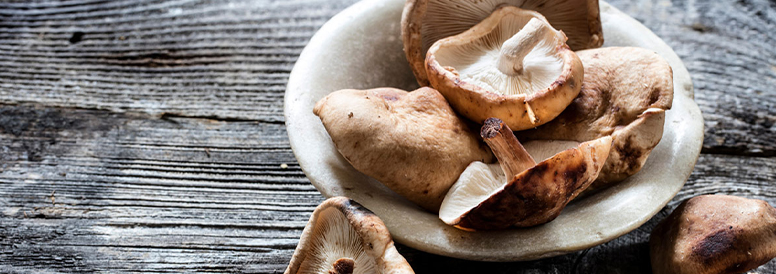Beta Glucans for Immune Support
Certain supplements are routinely recommended during the winter months. Vitamins A, C, and D support immune health and antioxidant defenses along with zinc.* Probiotics help to optimize mucosal immunity in the digestive and respiratory tracts.* Mushrooms, garlic, elderberry (Sambucus nigra) and olive leaf further support immune defenses.*
Research has shown that some β-glucans modulate immune function in humans.* β-glucan contains polysaccharides that are naturally found in foods like baker’s yeast (Saccharomyces cerevisiae), mushrooms, barley, oats, and rye. Those from fungi and yeast are best known for their ability to interact with innate immune cells of the gastrointestinal mucosa to prime innate immunity. Studies have shown that it’s best to take beta glucans daily for effective support.* That’s why mushroom supplements and yeast beta glucan have become so popular, and why new ingredients are being developed.
Active hexose correlated compound (AHCC) was developed in 1987 and is manufactured by the Amino Up Chemical Company in Japan. It’s widely used in Japan and is gaining popularity around the world.
The extract is made by culturing the mycelia of mushrooms from several hybridized species of the Basidiomycete family of mushrooms—which includes shiitake mushrooms (Lentinus edodes), in a liquid medium with rice bran so that the mushroom polysaccharides break down into low molecular–weight compounds of only 5,000 daltons. The resulting smaller-sized saccharides in AHCC are optimized for intestinal absorption. They overcome the absorption challenge faced by larger mushroom polysaccharides.
Like whole mushrooms, AHCC contains a mixture of starches, sugars, amino acids, and minerals. It also contains polysaccharides, beta-glucans, and alpha-glucans. The difference between whole mushrooms and AHCC is in the percentage of different types of saccharides.
Whereas the starches in whole mushrooms are primarily long-chain polysaccharides, AHCC is 74 percent oligosaccharides. A unique characteristic of AHCC is its high percentage of a type of oligosaccharides called partially acetylated alpha-glucans. These alpha-glucans are the low molecular–weight compounds that are responsible for the biological activity of AHCC.
Innate immunity involves natural killer (NK cells), macrophages, cytokines, and dendritic cells. Adaptive immunity involves B-cell and T-cell responses. The beauty of AHCC is that it supports both innate and adaptive immunity—primarily by supporting a healthy number and function of NK cells, macrophages, T-cells, and dendritic cells. It acts as an immunomodulator, meaning that it balances the immune response.*
The immune system is complex, and it requires a wide variety of nutrients to function as intended. Taking a broad-based integrative approach of consuming these nutrients in their natural forms, along with supplementation is where many practitioners feel most comfortable. However, like the new generation of curcumin supplements, sometimes science can improve on nature for the benefit of efficacy and convenience. AHCC is another ingredient showing similar promise.

